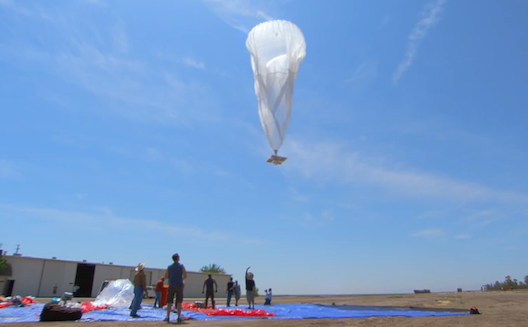How will Project Loon handle governments? Google answers our questions


In the Arab world, where internet censorship is the norm, Google’s
Project Loon, which aims to provide “balloon-powered internet for
everyone,” has been garnering quite a bit of interest
lately.
At the Arabnet
Digtal Summit in Dubai this past week,
Abdullah Hamed of Saudi gaming platform
GameTako grilled local Emirati telecom companies Etisalat and
du, as well as Saudi’s STC on their responses to the project.
Pointing to his tweet on the Twitterfall (below), he asked,
essentially, “What will you do when the Google Loon project comes
to distribute internet to everyone, independent of telecom
companies?”

In Saudi Arabia, where the government recently blocked VoIP service Viber and plans to block
Whatsapp, the question is especially pertinent.
The vision for project Loon, which Google announced two
weeks ago, is potentially revolutionary: it will use
giant balloons to offer internet access at speeds similar to
current 3G networks, to the estimated 5 billion people on the
planet who can't get online.
The balloons will fly at altitudes twice as high as commercial
planes, beaming internet down to special antennas stations on the
ground using solar-powered radio transmitters. Each weather-style
balloon is designed to provide an area the size of New York City
(1,250 square kilometers) with internet.
An
early test in New Zealand provided at least one sheep farmer
with 15 minutes of internet connection before the balloon floated
out of range.
While the Saudi and Emirati telecom companies didn’t have a quick
answer,
many share Hamed’s opinion in assuming that Google is aiming to
become the largest internet service provider (ISP) on the globe.
Yet, Google insists, in its video on Loon’s technology (below), its
ground stations will be connected to local ISPs,
so it will collaborate with local ISPs and telecoms rather than
compete with them.
The biggest challenge to Loon, as many have also illustrated, is
that it will be subject to the regulations of foreign governments
as it spreads across the globe. Not only will it have to negotiate
with governments for
bands of radio frequencies to use for its local transmissions,
it will also have to secure
flyover rights in each country its balloons traverse.
If Google doesn’t broker agreements ahead of time, Loon might
invoke a less than friendly response from governments that don’t
have similar internet freedom laws or don’t appreciate American
technology flying in their skies, Jillian York of the Electronic
Frontier Foundation points out in a
live discussion with Ahmed Shihab-Eldin on HuffPost Live.
To get some clarity on the vision and ambition of Google Loon,
Wamda chatted with a source at Google about the scope and future
plans of this revolutionary project. Here’s what a Google
spokesperson said:
WAMDA: Will Project Loon be limited to certain latitudes
until it gains flyover permission from all of the countries in a
certain latitude or region? How does Google foresee facing that
issue?
GOOGLE: Our goal is to make sure we
don't surprise anyone. We're going to start at about the 40th
latitude south. We'll be talking with the relevant
authorities in countries where we may be flying over or looking to
set up pilot programs e.g. Chile, Argentina, Uruguay,
Australia. There are already thousands of weather balloons
launched each year, so there are established processes that we
follow with local aviation authorities.
WAMDA: Once it does have flyover permission, is it correct
that the project would be dependent upon agreements with local
ISPs? Will it ever offer internet access that is independent of
local governments?
GOOGLE: Yes, we will connect to the
local Internet infrastructure in all countries where we have pilot
tests.
One of the reasons we're going public with this project is so we
can start getting feedback and start talking to potential partners
such as telcos. No one company or technology is going to solve this
problem, so we're going to need lots of partners, each of whom
knows the situation on the ground in their own country far better
than we ever could.
WAMDA: What security measures will be taken to protect the
Balloons?
GOOGLE: While transiting the balloon network, data is
automatically encrypted. Also, only specialized Loon Internet
antennas can access the Loon network.
WAMDA: How long does each balloon last, physically?
GOOGLE: Our hope is that ultimately each balloon could
last 100 days or more.
WAMDA: How long will the pilot phase in NZ last, and how
quickly will the project expand to other regions
GOOGLE: We don't have any detailed timelines to share
on the New Zealand pilot the team has just returned home to assess
what they've learned from the last couple of weeks, and we expect
to head back to NZ later in the year once the weather gets
better. We don't expect to have pilots in other countries
before 2014.
WAMDA: What impact does Google see this having on the
global population?
Our source at Google didn’t answer this question
directly, but it might be best answered by their introductory
video:


